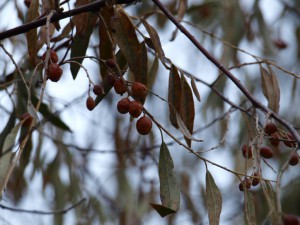
This particular IBA was located in a state hunting reserve to the south of Tashkent viloyat. Officials in the reserve are monitoring the bird presence, and a small part of the reserve, which is currently off-limits for hunting, is being managed to encourage a stable breeding population of birds and other wildlife, and to serve as a stopping place for migratory or wintering birds. We walked round with wardens from the hunting reserve, who spend their days there and know and love the area and its wildlife.
Despite the cold and the occasional rain, it was a glorious day. We saw dozens of species, from tiny warblers to majestic white-tailed eagles, including several that I had never seen before. I particularly enjoyed watching the marsh harriers – a very elegant, powerful bird of prey that almost died out in the UK in the 1960s because of pesticide poisoning and pressure on its habitat, but has since recovered. The day ended with the wonderful sight of thousands of crows and jackdaws gathering to roost for the night, making swirling, ever-changing shapes against the darkening sky.
Why does nature matter? Because of what it contributes to the world’s economy – it’s been calculated that the global value to mankind of ecosystem services – the services provided to us by nature – is greater than the world’s entire GDP. Because natural systems are extraordinarily complex and interdependent, and damaging one apparently unimportant element can have unexpected and serious impacts on other parts of the system. But also because of the splendour and the fragility of it all – as a British nature writer, Simon Barnes put it “our souls’ need, or one of our souls’ needs, is for wildness: for space, for green, for running water, for the fizz or even the faint buzzle of danger … without an element of the non-human in our lives, we are not properly human”.
